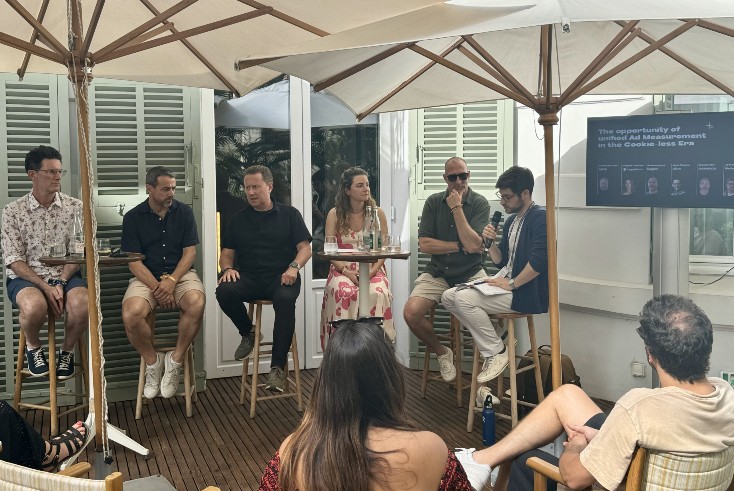‘Advertising doesn’t mean tracking people’: Why unified measurement is key post-cookie

Cannes Lions 2024 | Partner Content
“There is life after the cookie, I can tell you that.”
At a panel hosted by adtech company Happydemics, a specialist in measuring the impact of advertising, during the Cannes Lions, there was broad agreement on the need to move beyond the cookie.
Christophe Bize, chief data and insight officer and head of creative studio at adtech company Ogury, passionately argued for the ad industry to change its philosophy around user tracking and targeting online, arguing that it is not good for brands to be tracking users.
“I drink Diet Coke. I want to buy their drink for what it is. I don’t expect Coca-Cola to know my age, where I live, my passion points. Cookies and IDs have gone too far,” said Bize.
He continued: “Advertising doesn’t mean tracking people and targeting people that have been visiting your assets. Advertising is to inform audiences of your product.”
Others on the panel broadly agreed with the sentiment. But the question hanging over the conversation was about how the post-cookie future will and should play out.
The panel also included Steven Filler, UK country manager of ShowHeroes Group; John Piccone, Americas president of Adform; Graeme Lynch, vice-president, demand, EMEA, at Magnite; and Virginie Chesnais, chief marketing officer of Happydemics.
Brand-first metrics
Consensus was ultimately reached on the need for media and creative to come together more closely to improve digital ad effectiveness in a post-cookie future and that brand-first metrics are likely to be core to the next generation of measurement.
“The death of the cookie is actually creating a huge opportunity,” argued Lynch. “If you think about the planning stage and the creative stage, it’s always been very separated. You had the brand guys who were creating the story, the narrative and building that connection, and then you had the performance people who don’t really care about that and just want to get a click.”
Lynch suggested that way of working is “going to disappear”, because clients and agencies will push for more powerful creative, given the use of identifiers for targeting may go by the wayside.
Bize added that media and creative agencies should not be separated if digital advertising is to become more effective: “You need to align everything to deliver what you want to deliver.”
A more unified solution
The conversation centred on the need to not only move beyond the cookie, but to do so in a way that provides a much-sought-after unified measurement solution.
Yet unified ad measurement faces the particular challenge of running into the walled gardens of major tech companies.
Lynch argued that the deprecation of the cookie is “even more of an opportunity for us to level the playing field” because quality, context and delivery mechanisms will all be the beneficiaries of renewed importance.
However, he suggested the trend is currently to offer increasingly bespoke measurement solutions based on a given client’s goals and needs for their campaign, rather than providing one cross-media standard.
Chesnais disagreed, suggesting that unified measurement methods based on, for example, ad recall and brand uplift is “a way to have a good comparison between platforms and to bypass these closed [walled garden] platforms”.
She added: “Our analysis shows creative metrics do have an impact on metrics such as consideration and intent. With the deprecation of cookies, advertisers may have to adopt a more mainstream approach and target wider audiences, but it’s an opportunity for them to work more on the upper part of the funnel.”
The most future-thinking advertisers, according to Filler, are using brand-lift studies in combination with metrics such as attention and opportunity to see.
“It’s the combination that is important,” he noted.
How should CMOs and agencies prepare?
While some brands have made progress, most advertisers and their agencies still say they are not yet ready for the deprecation of the cookie.
According to a YouGov/Taboola study released this month, just a quarter (25%) of marketers surveyed said they are completely prepared for the cookie phase-out. Nearly half (46%) said they were happy with Google’s decision to delay deprecation.
Podcast: Marketers ‘relieved’ about cookie deprecation delay
When asked how to get both agencies and chief marketing officers (CMOs) on board for the post-cookie future, Lynch said that, going forward, the CMO will have to wrestle with a changing ad world that is “actually going to go back 50 years, because it’s gonna be based on context, premium delivery and outcomes in the shop offline and online”.
On the agency side, Piccone also noted that CMO turnover puts agencies “in a really tough spot”. Filler and Lynch gave agencies credit, nevertheless, for beginning to shift to working with data and measurement partners.
Still, the panellists argued that there is more agencies can be doing to prepare for the post-cookie future. Apart from bridging media and creative, Filler suggested agencies do a better job of pushing back on brands blindly chasing performance “to help them truly understand the value their partners are delivering”.
Bize added: “Are they really prepared [for cookie deprecation]? No they are not. But they should be.”




